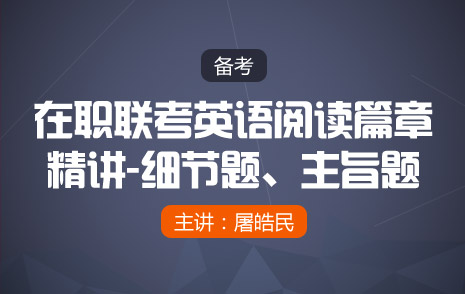2015-03-02 07:35:00 来源:网络发表评论
 在职联考准考证打印
在职联考准考证打印
备考辅导:英语备考策略和技巧 联考英语翻译备考策略 2015在职硕士考试经验技巧
GCT考试: GCT英语备考辅导 GCT数学备考辅导 GCT语文备考辅导 GCT逻辑备考
公共管理: 公文写作范文汇总 2015年在职MPA管理学案例材料 人力资源营销新论
艺术硕士: 艺术硕士艺术概论资料汇总 艺术硕士复习试题|答案 艺术硕士备考知识点
Passage 5
The world is going through the biggest wave of mergers and acquisitions ever witnessed. The process sweeps from hyperactive America to Europe and reaches the emerging countries with unsurpassed might. Many in these countries are looking at this process and worrying: “Won’t the wave of business concentration turn into an uncontrollable anti-competitive force?”
There’s no question that the big are getting bigger and more powerful. Multinational corporations accounted for less than 20% of international trade in 1982. Today the figure is more than 25% and growing rapidly. International affiliates account for a fast-growing segment of production in economies that open up and welcome foreign investment. In Argentina, for instance, after the reforms of the early 1990s, multinationals went from 43% to almost 70% of the industrial production of the 200 largest firms. This phenomenon has created serious concerns over the role of smaller economic firms, of national businessmen and over the ultimate stability of the world economy.
I believe that the most important forces behind the massive M&A wave are the same that underlie the globalization process: falling transportation and communication costs, lower trade and investment barriers and enlarged markets that require enlarged operations capable of meeting customer’s demands. All these are beneficial, not detrimental, to consumers. As productivity grows, the world’s wealth increases.
Examples of benefits or costs of the current concentration wave are scanty. Yet it is hard to imagine that the merger of a few oil firms today could re-create the same threats to competition that were feared nearly a century ago in the U.S., when the Standard Oil trust was broken up. The mergers of telecom companies, such as WorldCom, hardly seem to bring higher prices for consumers or a reduction in the pace of technical progress. On the contrary, the price of communications is coming down fast. In cars, too, concentration is increasing — witness Daimler and Chrysler, Renault and Nissan — but it does not appear that consumers are being hurt.
Yet the fact remains that the merger movement must be watched. A few weeks ago, Alan Greenspan warned against the megamergers in the banking industry. Who is going to supervise, regulate and operate as lender of last resort with the gigantic banks that are being created? Won’t multinationals shift production from one place to another when a nation gets too strict about infringements to fair competition? And should one country take upon itself the role of “defending competition” on issues that affect many other nations, as in the U.S. vs. Microsoft case?
1. What is the typical trend of businesses today?
A. to take in more foreign funds
B. to invest move abroad
C. to combine and become bigger
D. to trade with more countries
2. According to the author, one of the driving forces behind the M&A wave is ______.
A. the greater customer demands
B. a surplus supply for the market
C. a growing productivity
D. the increase of the world’s wealth
3. From paragraph 4 we can infer that ______.
A. the increasing concentration is certain to hurt consumers
B. WorldCom serves as a good example of both benefits and costs
C. the costs of the globalization process are enormous
D. the Standard Oil trust might have threatened competition
4. Toward the new business wave, the writer’s attitude can be said to be ______.
A. optimistic B. objective C. pessimistic D. biased
 已帮助8878人
已帮助8878人
| GCT | 【特训】2015年GCT英语全程专项特训班 | ¥980 | 免费试听 |
| 【特训】2015GCT语文全程专项特训班 | ¥400 | 免费试听 | |
| 【特训】2015年GCT数学全程专项特训班 | ¥680 | 免费试听 | |
| 【特训】2015年GCT逻辑全程专项特训班 | ¥400 | 免费试听 | |
| 联考英语 | 【提高】2015年联考英语技巧提高班 | ¥680 | 免费试听 |
| 【冲刺】2015年联考英语冲刺抢分班 | ¥680 | 免费试听 | |
| 法律硕士 | 【全程】2015法律硕士专业综合全程 | ¥880 | 免费试听 |
| 工商管理 | 写作专项零基础班数学专项逻辑专项 | ||
| 专项班 | 公共管理会计硕士教育硕士艺术硕士 | ||
版权及免责声明
1,"新东方在线"上的内容,包括文章、资料、资讯等, 本网注明"稿件来源:新东方在线"的,其版权 均为"新东方在线"或北京新东方迅程网络科技有限公司所有 ,任何公司、媒体、网站或个人未经授权不得转载、链接、转贴或以其他方式使用。已经得到 "新东方在线"许可 的媒体、网站,在使用时必须注明"稿件来源:新东方",违者本网站将依法追究责任。
2, "新东方在线" 未注明"稿件来源:新东方"的 文章、资料、资讯等 均为转载稿,本网站转载出于传递更多信息之目的,并不意味着赞同其观点或证实其内容的真实性。如其他媒体、网站或个人从本网站下载使用,必须保留本网站注明的"稿件来源",并自负版权等法律责任。如擅自篡改为 " 稿件来源:新东方 " ,本网站将依法追究其法律责任。
3,如本网转载稿涉及版权等问题,请作者见稿后在两周内与新东方在线联系。

 w
12分56秒
w
12分56秒